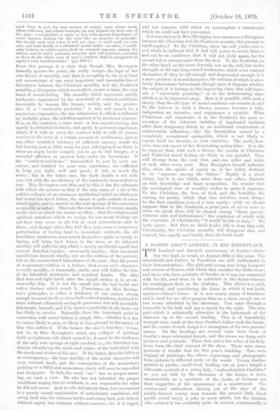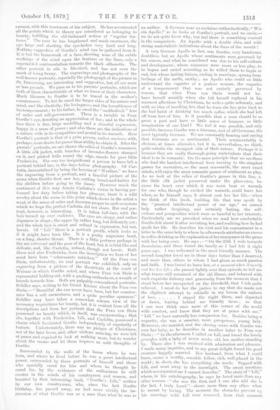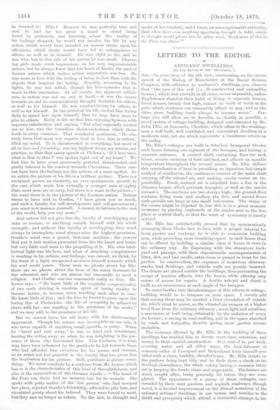A GOSSIP ABOUT GOETHE, IN HIS BIRTHPLACE.
THE hundred and thirtieth anniversary of Goethe's birth- day was kept, as usual, on August 28th of this year. The inhabitants and. visitors in Frankfort are still enthusiastic in their demonstrations. The girls and young men bring bouquets and crowns of flowers, with which they smother the birth-room ; and those who have portraits of Goethe, or of any one connected with his life, send them to he exhibited in the shrine whereto the worshippers flock on the birthday. This shrine is a solid, substantial, and considering the times in which it was built, spacious citizen's house. It is now nearly empty of furniture, and is used for no other purpose than as a show, except one or two rooms inhabited by the showman. You enter through a turn-stile in the hall, and pay a marck for the sight. The only part which is artistically attractive is the balustrade of the staircase up to the second landing. This is of beautifully wrought iron, made at the time Goethe's father took the house ; and the centre of each design is a monogram of his two parents' names. On the landings are several casts from busts of Goethe's more celebrated friends, and the rooms are hung with pictures and portraits. These last, and a few relics of his lady- loves, form the chief interest of the show. There were many portraits of Goethe lent for this year's birthday. Two were original oil paintings, the others engravings and photographs from pictures in different parts of the world. Young Goethe, painted in profile, small-sized, holding out at arm's length a silhouette portrait of a young lady, " wa,hrscheinlich Carlotta," as you are told by the showman of the house, is more characteristic as a specimen of the faults of German art than suggestive of the appearance of a master-poet. The sentimental enthusiasm shining out of the gaze of the neatly-dressed young man towards the prosaic little black profile would imply a joke to most minds, but the German who painted it was evidently quite in earnest, sentimentally in aruest, with this treatment of his subject. He has accentuated all the points which in theory are considered as belonging to beauty, fulfilling the old-fashioned notion of "regular fea- tures." The nose he has lengthened and made enormous, the eye large and starting, the eye-lashes very hard and long. Nothing suggestive of Goethe's mind can be gathered from it. It is but the framework of a face, showing none of the subtle .workings of the mind. upon the features or the lines, only a ftaiperadded sentimentalism towards the black silhouette. The other portrait in oils is life-sized, and has not even the merit of being funny. The engravings and photographs of the well-known portraits, especially the photograph of the picture in .St. Petersburg, are interesting and suggestive, but all are more or less prosaic. We pass on to his parents' portraits, which are both of them characteristic of what we know of their characters. Much likeuess to Goethe is to be traced in the mother's countenance. To her he owed the larger sides of his nature and mind, and the elasticity, the lovingness, and the loveableness of his temperament ; to his father, he owed the " methodisch " love e order and self-government.There is a twinkle in Frau Goethe's eye, denoting an appreciation of fun ; and in the whole face there is fine, large modelling • and a cheerful expression, happy in a sense of power; and also there are the indications of a nature wide in its sympathies and genial in its warmth. Herr Goethe's portrait is that of a prim person, rather anxious, with, perhaps, more desire for power than ability to obtain it. After the parents' portraits, we are shown the relics of Goethe's romances. A little silk jacket, with bunches of lavender flowers stamped on it, and pinked frills round the edge, stands for poor little Fredericka. She was too insignificant a person to have left a portrait behind her, in the days before photography. Of Car- lotta, immortalised by being the heroine of " Werther," we have the engraving from a portrait, and a fanciful picture of the cene when Goethe first saw her, cutting bread-and-butter for the children before going to the dance. However much the 'sentiment of this may denote Carlotta's virtue in having per- formed her duty before taking her pleasure, there is a wild revelry about the scene in this print which shows in the artist a want of the sense of order and decorum proper to such occasions which we hope the perfect Carlotta did not share. Her real por- trait, however, is interesting. It is taken full-face, with the hair turned up over cushions.. The eyes are sleepy, and rather Japanese in shape ; the upper hp rather long, but delicately cut; and the whole face is sweet and refined in expression, but not, heroic. Of " Lili " there is a portrait profile, which looks as if it might have been like. It is a pretty mignonne head, i on a long, slender throat. There s a little pertness perhaps in the wiz rctrous8é and the pose of the head, but it is bird-like and 'delicate, and, like Carlotta, refined, though not heroic. Both these and also Fredericka, from the description we hear of her must have been " scharmante miidcheu." Of the Frau von Stein, unfortunately, no real portrait was exhibited, only an engraving from a picture of the theatricals at the court of Weimar in which Goethe acted, and where Frau von Stein is .represented holding out, with a gushing enthusiasm, a wreath of laurels towards him. Both are palpably conventional portraits. Schiller says, writing to his friend Korner about the Frau von Stein :—" Beautiful she can never have been, but her counten- ance has a soft earnestness, and a quite peculiar openness." .Schiller may have taken a somewhat solemn. view of the necessary requisitions for beauty, but it is evident from all the .descriptions and from her portrait that the Fran von Steiu
possessed no beauty which, in itself, was Overpowering; that she, together with Fredericka, L111, and Carlotta, possessed a charm which fascinated Goethe independently of regularity of feature. Unfortunately, there wasno picture of Christiana, or of the later loves, and, other visitors arriving, we were left at peace and required. to look at .nothing more, but to wander about the rooms and let them impress us with thoughts of Goethe.
Surrounded by the walls of the house where he was born, and Where he lived before he was a great intellectual power, surrounded by these portraits of himself and those who specially cared for him and whom he thought he
cared for, by the evidences of the enthuoiasm he still creates in the minds of his countrymen and women, and haunted by that interesting book, "Goethe's. Life," written by our own countryman, who, since the last Goethe birthday, has passed. away, we feel more vividly the im- mssion of what Goethe was as a man than what he was as
an author. A German near us-exclaims enthusiastically," Wie cin Apollo !"as he looks at Goethe's portrait, and we smile,— we do not quite know why, but feel there is something comical in the comparison. An Apollo with a double chin, and with strong materialistic indications about the lines of the mouth !
A very German Apollo in fact, was Goethe, very handsome, doubtless, but an Apollo whose sentiments were governed by his reason, and what he considered was due to his self-culture and development ; whose romances were more or less play, to be begun and ended according as he willed them to begin or end, but whose lasting liaison, ending in marriage, sprang from feelings of the earth, earthy ; an Apollo who could so little understand the vagaries of a jealous woman, the vagaries of a temperament that was not entirely governed by reason, that when Frau von Stein would . not be- have herself amiably when she felt herself replaced in his
warmest affections by Christiana, he writcs quite solemnly, and. with no idea of insulting her, that he fears she has gone back to the bad habit of drinking too much coffee, which she had left off from love of him. Is it possible that a 'man should be so great a poet and have so little sense of humour, so little imagination of one kind P We feel it was possible, and only possible, because Goethe was a German, and of all Germans, the most typically German. We are constantly hearing and saying that Germans are so sentimental. Their sentimentality is obvious, at times obtrusive, but it is, nevertheless, we think, quite outside the strongest side of their nature. Perhaps it is because they are really thorough-going materialists that their ideal is to be romantic. On the same principle that we see those who lead the hardest intellectual lives turning to the simplest games for recreation, so the most reasonable, the most exact minds, will enjoy the most romantic games of sentiment as play. As we look at the relics of Goethe's games in this line, a the little silk jacket preserved under the glass-ease, be- cause the heart over which it was worn beat so warmly for one who, though lie excited the warmth, could leave her when, as he himself says, it almost cost her her life,—when we think of this fresh, budding life that was spoilt by the " greatest intellectual power of our age," we cannot help rather despising, and certainly hating, the self- culture and pomposities which were so baneful to her interests. Particularly are we provoked when we read how comfortable Goethe felt about it after revisiting her, and realising how he had spoilt her life. He describes his visit and his contentment in a letter to the same lady to whom he afterwards attributes an excess in coffee-drinking as the explanation of her annoyance at the game with her being over He says :—" On the 25th I rode towards Sesenheim, and there found the family as I had left it eight years ago. 1 was welcomed in the most friendly manner. The second daughter loved me in those days better than I deserved, and more than others to whom I hind given so much passion and faith. I was forced to leave her, at a moment when it nearly cost her her life ; she passed lightly over that episode, to tell me what traces still remained. of the old illness, and behaved with such exquisite delicacy and generosity from the moment that I stood before her unexpected on the threshold, that I felt quite relieved. I must do her the justice to say that she made not the slightest attempt to rekindle in my bosom the embers
of love I stayed the night there, and departed at dawn, leaving behind me friendly faces ; so that I can now think once more of this corner of the world. with comfort, and know that they are at peace with me." " Lili " we have naturally less compassion for. Besides being a coquette, she was a smarter, more prosperous, young lady. Moreover, she married, and the closing scene with Goethe was over her baby, as h i
e describes n another letter to Frau von Stein :—" In the afternoon I called on Lili, and found the lovely yraseffen, with a baby of seven weeks old, her mother standing by. There also I. was received with admiration and pleasure. I made many inquiries,. and to my great delight found the good creature happily married. Her husband, from what I could learn, seems a worthy, sensible fellow, rich, well-placed in the world ; in short, she has everything she needs. Supped with Lili, and went away in the moonlight. The sweet emotions which accompanied me I cannot describe." The story of " Lili," whom, in Ills autobiography, he says he loved more than any other woman—" she was the first, and I can also add she is the last, I truly loved "—shows more than any other what lie meant by loving. The moment the obstacles prevent ng his marriage with Lili were removed, from that moment
he dreaded it ! Why Because he was perfectly true and
real, he had far too great a mind to stand being bored by pretences, and knowing where the reality of his feelings stoppedr he would not involve his life by any action which would have entailed an unwise strain upon his affections, which strain would have led to unhappiness to others, as well as to himself. Ho was right so far, and he was wise, but in this side of his nature he was small. Charm-. ing girls mule vivid impressions on his very impressionable nature, but he always knew that his heart of hearts, the part of human nature which makes action imperative, was free. He was more in love with the feeling of being in love than with the objects that inspired the feeling. Possibly, according to his lights, he was not selfish, though his love-episodes lead so much to this conclusion. At all events, his apparent selfish- ness in action was not an end in itself,—it was the means towards an end he conscientiously thought desirable for others, as well as for himself. He was comfort-loving for others, as well as for himself. In one period of his life, we find him trying daily to spend legs upon himself, that he may have more to give to others. Early in life we find him enjoying Spinoza with supreme satisfaction, and saying, "But what especially riveted me to him, was the boundless disinterestedness which shone forth in every sentence. That wonderful sentiment, 'He who truly loves God must not require God to love him in return,' filled my mind. To be disinterested in everything, but most of all in love and friendship, was my highest desire, my maxim, my practice, so that that saucy speech of Philena's, If I love thee, what is that to thee P' was spoken right out of my heart." We find him in later years generously grateful, disinterested, and gently tolerant in his conduct towards Christiana. These can- not have been the feelings nor the actions of a mere egotist. As an artist, the picture of his life is a brilliant picture. There is a sustained power, an elasticity, an ever-spontaneous growth to the end, which made him virtually a younger man at eighty than most men are at forty, but there is a want in the picture,— the want there is in the picture of the German nation. Nature seems to have said to Goethe, I have given you so much, and such a faculty for self-development and self-government ; you must now manage yourself. I cannot, in fairness to the rest of the world, help you any more."
And nature did not give him the faculty of worshipping any man or woman, or anything outside himself with his whole strength ; and without this faculty of worshipping, lives must always be incomplete, must always miss the highest greatness. Goethe's mind was a grand, first-rate machine ; the powers that put it into motion proceeded from the the heart and brain, but very little soul went to the propelling of it. His own intel- lectual light was his hero, and what of clenching completeness is wanting in his actions and feelings, was caused, we think, by the avant of a light recognised as above himself towards which his soul could yearn. There were no ghosts about his life ; there are no ghosts about the lives of the many Germans he has educated, and who are almost too reasonable to need a religion. And Goethe was too reasonable really to love. Mr. Lewes says :—" He knew little of the exquisite companionship of two souls striving in emulous spirit of loving rivalry to become better, to become wiser, teaching each other to soar. He knew little of this ; and the kiss he feared to press upon the loving lips of Fredericka—the life of sympathy he refused to share with her —are wanting to the greatness of his works," and we may add, to the greatness of his life.
But we cannot leave his old home with his shortcomings uppermost. Though his nature was incomplete on one side, it was never capable of anything small,.ignoble, or petty. When he "loved and rode away," he was as kind and considerate, barring the riding away, as when he was delighting in the pre- sence of those who fascinated him. This kindness; it is true, may have been enhanced by the gratitude he felt towards those who had afforded him situations for his poems and dramas, as an artist will feel grateful to the beauty that has given him the inspiration for his picture. Still, gratitude is always some- thing. We must conclude by a sentence from Mr, Lewes, which has in it the characteristics of this kind of thoughtfulness, and also of the materialism of the German Apollo :—" The heart of the Frau von Stein had no memory but for its wounds. She spoke with petty malice of the 'low person' who had usurped her place, rejected Goethe's friendship, affected to pity him, and circulated gossip about his beloved. They were forced to meet, but they met no longer as before. To the last, he thought and spoke of her tenderly, and I know, on unexceptionable authority, that when there was anything appetisimg brought to table, which he thought would please her, he often said, Send some of this to. the Fran von Stein."




































 Previous page
Previous page